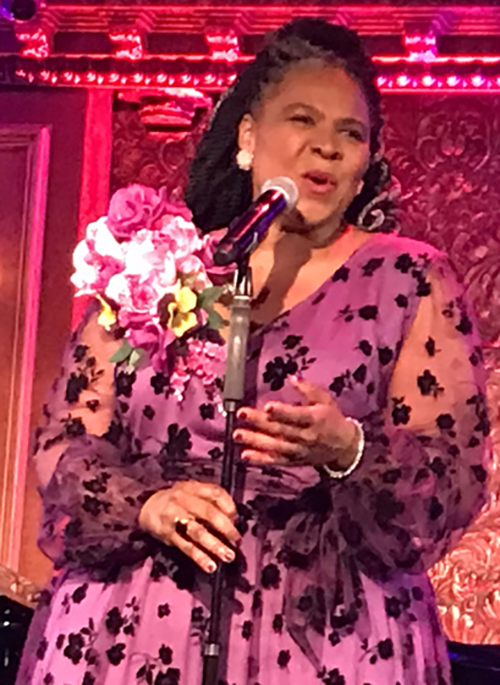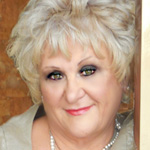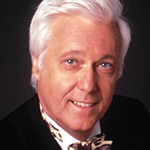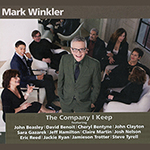Amanda King
Ella: The Early Years
%4 Below, NYC, May 19, 2023
Reviewed by Alix Cohen

Amanda King
“Tonight, this is the Savoy Ballroom,” Amanda King announced as she swung into Edgar Sampson’s “Stomping at the Savoy.” (The Savoy 1926-1958 was “a building, a geographic place, a ballroom, and the ‘soul’ of a neighborhood.”—Barbara Englebrecht.) King exuded warmth. Wielding a resonant back-of-the-throat hum/vibrato, the vocalist seamlessly connected to and savored the lyrics. Never remaining still, she made the rhythm of the songs and her performing infectious.
Ella Fitzgerald (1917-1996), King told us, had regularly cutting classes until she was arrested for truancy and was incarcerated in the New York State Training School for Girls. “Those of color” had a very tough time. She ran away, lived on couches and on the streets, ran numbers, and warned of cops at whorehouse doors. About eight months later, at 17, she performed on Amateur Night at the Apollo. Nicknamed “snake hips” for her street dancing, the young woman planned to dance at the contest until she watched the Edwards Sisters excel just before her.
On the spot, she switched to vocals in the style of her mother’s favorite singer, Connee Boswell. One of the numbers she chose was “Judy” (Hoagy Carmichael/ Sammy Lerner): “If her voice can bring/Every hope of the spring/ That’s Judy, my Judy.” This rarely performed song is cozy, affectionate, and very much of its time; it was well served by King.
Eight months later Fitzgerald had her first credited hit with “I’ll Chase the Blues Away.” (Edgar Sampson/Ken Harrison). King bounced, danced, and grinned as she sang; the lady knows how to moooove. Her gesturing hands extended the spirit of the song; the piano jitterbuged. King told us about Fitzgerald’s life story: “fronting the Chick Webb Orchestra as one of the first female band singers, she went from living on the street to making $1,200 a week.” Webb, his wife, and the band taught her deportment and style. Webb and Fitzgerald collaborated for four formative years. “Everybody Step” (Irving Berlin) and “Vote for Mr. Rhythm” (AI Siegel/Leo Robin/Ralph Rainger) arrived peppy and bright from King.
She then turned the stage over to drummer Jerome Jennings, who told us that Webb had influenced every fine percussionist of his time. “Liza (All the Clouds Roll Away)” (George & Ira Gershwin/Gus Kahn) showcased his formidable chops with hummingbird speed and finesse. (You couldn’t recognize the melody.)
“You Showed Me the Way” (Bud Green/Ella Fitzgerald/Teddy McCrae/Chick Webb) might have expressed gratitude to Fitzgerald’s mentor: “The moment you found me/The shadows around me” (King’s head tilted up, eyes closed) “Just disappeared from view.” Satin phrases slowly unfurled. The brushes rippled beside a little light cymbal, the bass mused. The song landed as softly as a drifting leaf. Fitzgerald’s signature “A-Tisket, A-Tasket” (Ella Fitzgerald/Van Alexander) introduced in the Abbot and Costello film Ride’m Cowboy, was hap-hap-happy.
The evening ended with a tender “Moonray” (Artie Shaw/Arthur Quenzer/Paul Madison) into which King put her whole self, and “My Old Flame” (Arthur Johnson/Sam Coslow) was delivered with molasses-like phrasing as though the vocalist were tasting memory.
Small caveats: There was a bit too much loose exposition, which could easily be fixed. Also, cabaret audiences are not, like fans of jazz, drawn to shows with so much time allotted to instrumentals. They’ve come to hear vocals.
Note: Amanda King dressed for the occasion, setting the tone of the evening. Would that more performers followed suit. In addition to Jennings, King was backed by Noah Garabedian (bass) and Caili O’Doherty (piano).
This show was an excellent showcase for a charming personality who made apt stylistic choices apt stylistic choices and had appealing vocal timbre, polished diction, and a beguiling feel for the era. Amanda King is worth seeing and hearing.





